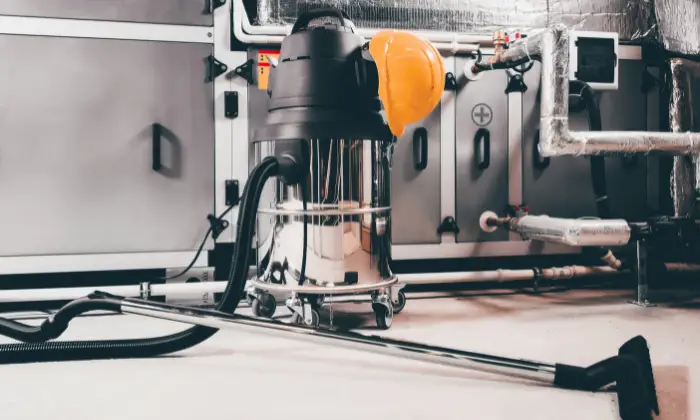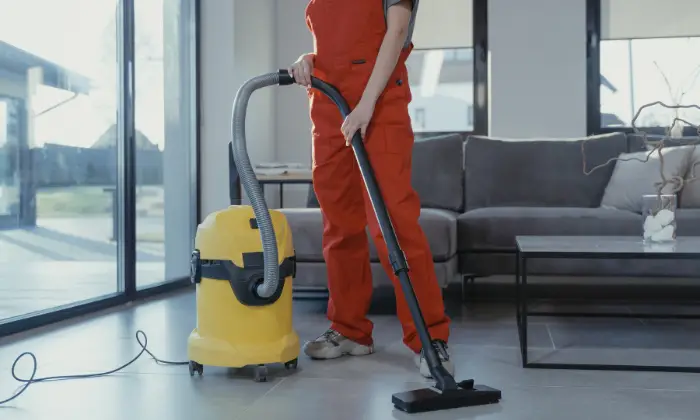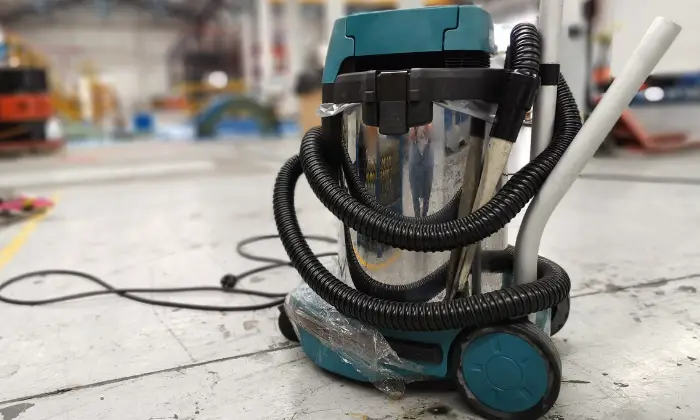
Industrial vacuum cleaners are powerful cleaning machines used in various industries for heavy-duty cleaning tasks. They can remove dust, debris, and other contaminants from floors, machinery, and other surfaces. This article will explore what is industrial vacuum cleaner, how they work, and their benefits.
What is Industrial Vacuum Cleaner?
An industrial vacuum cleaner is a specialized machine that can handle a significant amount of debris, including hazardous substances, liquids, and solids.
Unlike regular vacuum cleaners, these machines use high-powered suction to eliminate dust, dirt, and other contaminants from various surfaces such as floors, walls, and equipment.
Industrial vacuum cleaners are a necessity in a range of industries, including healthcare, manufacturing, and construction. These machines play a crucial role in ensuring the cleanliness and productivity of these sectors.
They are designed to meet the high demands of these industries, where cleanliness and hygiene are of utmost importance.
In short, we can say an industrial vacuum cleaner is a powerful machine that is tailored to the unique demands of industrial settings.
These machines are essential for maintaining a clean and safe environment, promoting productivity, and ensuring that employees work in a healthy atmosphere.
Please support us by following us on LinkedIn – https://www.linkedin.com/company/house-stopper
How Do Industrial Vacuum Cleaners Work?
The suction in an industrial vacuum cleaner is generated by a motor that drives a fan or impeller, which creates negative pressure in the vacuum cleaner’s collection tank or bag. As air is drawn into the collection tank or bag, it carries dust and other debris trapped by a filter or separator.
The type of filter or separator used in an industrial vacuum cleaner will depend on the type of debris being collected. For example, a vacuum cleaner used to collect fine dust particles may use a HEPA filter. It has been designed to capture particles – as small as 0.3 microns.
Benefits of Using an Industrial Vacuum Cleaner

Using an industrial vacuum cleaner offers many benefits, including:
Improved Air Quality
Industrial vacuum cleaners are designed to remove dust, dirt, and other contaminants from the air, which can improve indoor air quality & reduce the risk of respiratory problems. This is especially important in industries such as healthcare and pharmaceuticals, where cleanliness is crucial.
Increased Productivity
Industrial vacuum cleaners can quickly and efficiently clean large areas, saving time and increasing productivity. They are also designed to handle heavy-duty cleaning tasks, which can reduce the need for manual cleaning and improve overall efficiency.
Cost-Effective
Although industrial vacuum cleaners may be more expensive than traditional vacuum cleaners, they are often more cost-effective in the long run. They are designed to be durable and long-lasting, which can reduce the need for frequent repairs and replacements.
Types of Industrial Vacuum Cleaners

There are several types of industrial vacuum cleaners available, each with its own unique features and benefits. These include:
- Dry vacuums: These are the most common type of industrial vacuum cleaners and are used to pick up dry materials, such as dust, dirt, and debris.
- Wet vacuums: These are designed to handle wet materials, such as liquids, slurry, and floodwater. They can also be used for dry materials.
- HEPA vacuums: These vacuums are equipped with high-efficiency particulate air (HEPA) filters that can capture 99.97% of particles as small as 0.3 microns. They are ideal for applications where the removal of hazardous materials is necessary.
- Backpack vacuums: These are lightweight and portable vacuums that can be worn on the back. They are ideal for cleaning hard-to-reach areas, such as stairs, corners, and tight spaces.
- Drum vacuums: These vacuums are designed to handle large volumes of debris and can be used for industrial applications, such as cleaning up metal shavings or wood chips.
Applications of industrial vacuum cleaners:
Industrial vacuum cleaners have a wide range of applications in various industries, including:
- Manufacturing: Industrial vacuums are used to clean manufacturing facilities and remove debris and dust from production equipment.
- Construction: They are used to clean construction sites and remove debris and dust from concrete floors and walls.
- Healthcare: Industrial vacuums are used to clean hospitals and healthcare facilities, where the removal of hazardous materials is crucial.
- Automotive: They are used to clean automotive factories and remove debris and dust from assembly lines and manufacturing equipment.
Conclusion
In conclusion, industrial vacuum cleaners are essential tools for maintaining cleanliness and productivity in various industries. Choosing and maintaining the right industrial vacuum cleaner for your industry can improve air quality, increase productivity, and reduce costs in the long run.
FAQs
Q1: What is the difference between an industrial vacuum cleaner and a regular vacuum cleaner?
A: The main difference between an industrial and a regular vacuum cleaner is its capacity and power. Industrial vacuum cleaners are designed to handle large volumes of debris and are more powerful than regular vacuum cleaners. They are also built to withstand heavy-duty use and are often used in commercial and industrial settings.
Q2: What are the benefits of industrial vacuum cleaners?
A: Industrial vacuum cleaners offer several benefits, including efficient and effective cleaning, improved air quality, and increased safety. They are designed to remove large amounts of debris quickly and thoroughly, making them ideal for use in large commercial or industrial spaces. They also help reduce airborne particles, improving air quality and creating a healthier working environment. Additionally, industrial vacuum cleaners are built to meet safety regulations and prevent accidents in the workplace.
Q3: Are industrial vacuums better?
A: Industrial vacuums are typically better than regular vacuums in power, capacity, and durability. They are designed to handle heavy-duty use and can easily pick up large amounts of debris, making them ideal for use in commercial and industrial settings. Additionally, they are built to meet safety regulations and prevent accidents in the workplace, which is especially important in industrial environments.
Q4: What is an industrial vacuum?
A: An industrial vacuum is a vacuum cleaner designed for heavy-duty use in commercial and industrial settings. They are typically more powerful and have a larger capacity than regular vacuum cleaners, making them ideal for handling large volumes of debris.
Q5: Can I use an industrial vacuum cleaner at home?
A: While industrial vacuum cleaners are designed for heavy-duty use in commercial and industrial settings, they can also be used in homes. However, they may be more expensive and more complicated to manoeuvre than regular vacuum cleaners, so that everyone may have better options.
Q6: What are the two types of vacuum cleaners?
A: There are two main types of vacuum cleaners: upright and canister. Upright vacuum cleaners are the most popular type and are designed for carpets and rugs. Canister vacuum cleaners are typically more versatile & can be used on various surfaces, including carpets, rugs, and hard floors.





